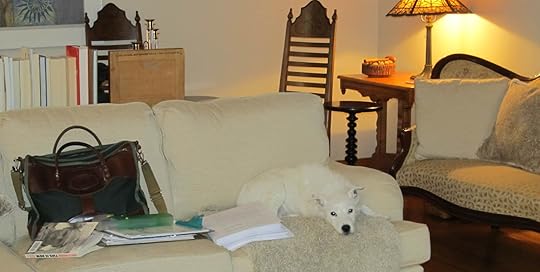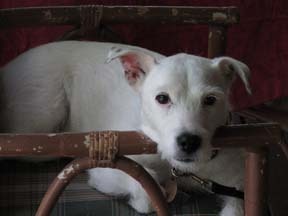Last edit, Amazon page & blurb

[That big stack of paper beside Belle, my editing buddy, is my typeset memoir.]
The past couple of weeks I’ve worked my way through page proofs for my book. My last crack at perfecting Shepherd: A Memoir. As I’d leave classes for the day, walking across the campus’s lovely old green I’d think, I can’t keel over dead. Not yet. Not under this ginkgo tree. Not until I submit my edits!
So life went on. I nursed Kathy through emergency dental surgery. Walked the dog. Went to committee meetings. Ordered a new computer. Read lots of student essays. One was heartbreaking. And a brave work of art. It was rewarding to see some of my teaching come back, or at least see what grew in a space I created, but celebrating it was fraught. I told its author what Augusten Burroughs recently told me, in This is How: Surviving What You Think You Can’t (which recently I too briefly reviewed):
As it happens, we human beings are able to live just fine with many holes of many sizes and shapes.
And pleasure, love, compassion, fulfillment—these things do not leak out of holes of any size.
So we can be filled with holes and loss and wide expanses of unhealed geography—and we can also be excited by life and in love and content at the exact same moment.
Though there will always be days, like the weather, when the loss returns fresh and full and we will reside within it once again, for a while.
Loss creates a greater overall surface area within a person. You expand as a result of it.
That’s me, I’d say. Expanded all over the place. And Augusten is right, love and loss are a pair. Reading my page proofs, typeset in elegant Adobe Garamond Pro, was to sit side-by-side with love and loss. There on the couch, with the dog. (She’s a strange, furtive thing, and I love her too.)
I found only one typo, a truncated word. And too many instances where I repeated the same word several times within a few sentences. Set in type, words jumped out in a new way. Sentences I’d recast in one mood, years ago, I felt the urgent need to alter. Or even to change a few back to what I recalled doing in the first place. Not for the first time, I thought, I am not smart enough to do this work.
Then someone called my attention to the fact that already my book, not due till May 1, has an Amazon page. And then I received this amazing endorsement from Lee Martin, a Pulitzer finalist in fiction, a great memoirist, and one of my writing heroes:
Shepherd is the story of one man’s dream of returning to the land, but Richard Gilbert’s glorious memoir is more than that. It’s a universal story of families, the ones we try to redeem and the ones we strive to create and maintain. Gilbert writes with a keen eye and a quiet grace. His portrait of the natural world takes us into the interior landscape of its very human, very likeable guide—an honorable, courageous man. I’m so very happy to have had the chance to meet him in these pages.
—Lee Martin, author of Such a Life and From Our House
As Dad used to say, That’s better than a sharp stick in the eye!
[Editing is hard work.]
Oh, that’s another thing. How I missed Dad and Mom as I worked this last time on Shepherd. The book is so much about them, really, as Lee saw. Dad died a few years after he couldn’t physically operate his nursery anymore. The book he wrote before my birth, Success Without Soil, as I’ve noted, goes on and on. It has its own listing on Amazon. Some of his oaks, raised from acorns he collected, must be a hundred feet tall.Writers and their books, farmers and their crops. Gotta see how they turn out. That next bunch of calves, foals, lambs. That extra three-bushels an acre corn. That perfect next composition. You see your work, you see your failure, you love the thing itself.
I could keel over now. My war-hero uncle used to say, when aged, “I’m under consideration.” Aren’t we all? But though the winter comes, ushered on a low November sky, my publisher is sending me bound galleys, made from uncorrected proofs, and it would be nice to hold them.
And in spring, the book.




